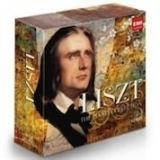The first four discs of EMI’s 10-CD Liszt anniversary collection feature Aldo Ciccolini in the complete Années de pèlerinage (his superb stereo remakes), Harmonies poétiques et réligieuses, the three Liebesträume, six Consolations, the two Ballades and, best of all, the gorgeously nuanced St. Francis Légendes. Discs five and six continue with Georges Cziffra’s volatile stereo versions of the Hungarian Rhapsodies (he plays the first 15, followed by his own transcriptions of numbers 16 and 19), tepid readings of the Polonaises and Valse-Impromptu, and a truly hell-for-leather Grand Galop Chromatique.
The 12 Transcendental Etudes pose no problems for Vladimir Ovchinikov’s virile, big-boned technique, while Mikhail Rudy turns in solid, regulation-model traversals of the two Concert Studies and Four Valses oubliées. From André Watts’ EMI Liszt holdings come the six Paganini Etudes and three late pieces. A pity that Watts’ excellent B minor Piano Sonata was passed over in favor of John Ogdon’s alternately inspired and disengaged recording. However, the characterful force of Ogdon’s Fifteenth Rhapsody and Valse oubliée No. 1 justifies their inclusion alongside the aforementioned Cziffra and Rudy versions.
I can’t pretend to love Jeanne-Marie Darré’s dry and notey La leggiereza and Un sospiro, while Leif Ove Andsnes’ Mephisto Waltz No. 1 and Stephen Hough’s Rhapsodie espagnole boast impressive poise and finish, yet remain slightly reserved and studio-bound. Strange that this so-called “piano collection” concludes with organ music, yet given Lionel Rogg’s forward sweep and virtuosic panache in the “Ad nos” and B-A-C-H fugues, I shouldn’t complain.
Edward Morton Jack’s booklet notes provide an excellent and informative time-line tracing Liszt’s life and creative output. While superior individual recordings can be had of most of the works here, EMI’s Liszt Piano Collection still offers good value and overall enjoyment for not much money.
































